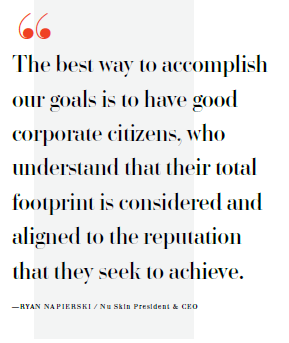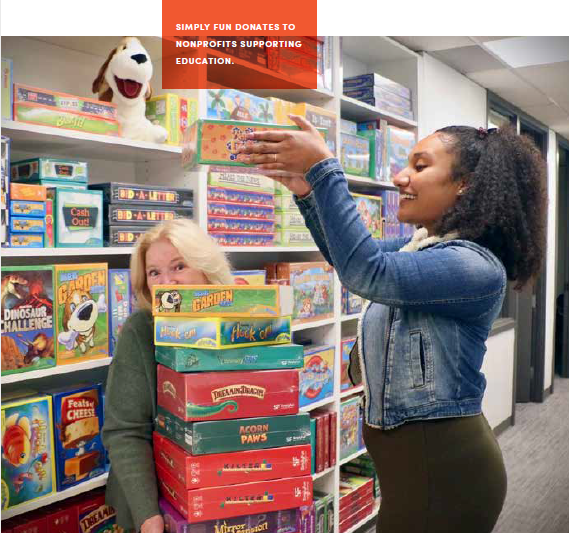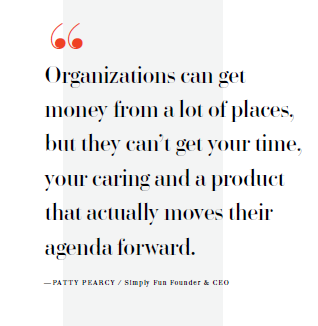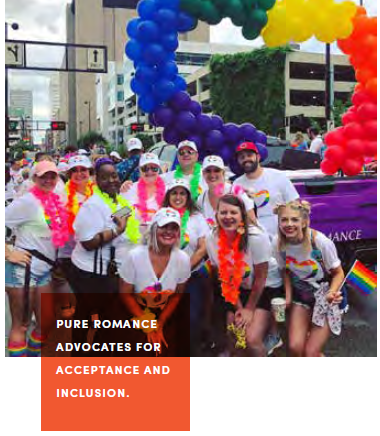Taking a Stand. Making an Impact.
Corporate Social Responsibility is an expectation, the price of entry to succeed and remain relevant in business.

We are what we say; what we do; how we do it; and what we choose not to do. Our products, the programs we initiate, the technological and social advancements we usher forth—they all matter. They comprise a corporate footprint that impacts the planet and every man, woman and child who inhabit it.
Wrestling with policy decisions, manufacturing choices and how and when to speak out and act on social issues happens daily, as business leaders face stakeholders who expect corporate words and branding to match their deeds, and 21st century transparency leaves inauthentic players vulnerable.
Corporate Social Responsibility (CSR) or Environmental, Social, Governance (ESG)—the umbrellas under which diversity/inclusion, sustainability, philanthropy, social justice, human rights, compliance and regulation live—is an expectation. It is simply the price of entry to succeed and remain relevant in business. It’s also an opportunity for businesses to look beyond profits, focus on people and become the change makers the world so desperately needs.
Speaking Up, Speaking Out
Salesforce CEO Marc Benioff recently posed a thought-provoking question during a National Public Radio interview. “Is business the greatest platform for change?”
In his third decade leading the San Francisco-based Fortune 500 company, Benioff believes CEOs wield tremendous power and it is their duty to use that power for good. “Good” means different things to different people, but for Benioff it has meant leveraging strength as a large-scale employer with the ability to relocate thousands of jobs when Indiana legislated LGBTQ discrimination and most recently pushing back against a controversial Texas abortion ban and offering to help Salesforce employees exit Texas if they chose do so.
Benioff is no stranger to controversy surrounding issues he believes would adversely impact Salesforce staff, but corporate public advocacy like this was once rare for fear of alienating customers and shareholders. However recent events like the killing of George Floyd compelled many corporate executives to publicly take on racial inequality, among other social issues, within their own companies.
CEOs now understand that a microphone comes with the job. While switching it on comes at their discretion, more corporate leaders are choosing to become a public voice that devalues bad, unethical and tone-deaf behavior, while leading and promoting actions that benefit the greater good.
The direct selling industry consists of and serves an incredibly diverse global marketplace of culturally varied distributors and affiliates empowered economically to serve customers—people of all types with all manner of interests and education and backgrounds. The industry’s reach—when considered from this view—blows the mind. How we choose or choose not to do business matters more than ever.
Learning Our Way to Better
Enormous potential exists for the direct selling industry within the environmental, social and governance pillars that comprise what we think of as Corporate Social Responsibility.
Research by IO Sustainability, an international research and consulting firm studying how sustainability and CSR initiatives are good for business, shows that corporate-wide CSR integration:
- Enhanced sales by as much as 20 percent
- Increased productivity 13 percent
- Reduced employee turnover by half
- Created a “reputation dividend” worth up to 11 percent of market capitalization
- Increased company share price by up to 6 percent
- Reduced financial and litigation risk, the cost of equity and the cost of borrowing
Other studies show that CSR/ESG initiatives can improve brand equity and reputation, gain favor with younger consumers, increase loyalty, command a premium price for goods, increase employee satisfaction and productivity as well as attract business investors.
Plus, it’s simply the right thing to do.
Earlier this year, the World Federation of Direct Selling Associations (WFDSA) mounted an Advocacy Committee to work on CSR/ESG from an industry perspective. It’s a three-year initiative with USDSA to enhance industry reputation holistically, using CSR/ESG advocacy and good corporate citizenship as a model. Ryan Napierski, Nu Skin President/CEO, is the chair.

According to Napierski, reputation is one of the most important pillars of future success. It’s a collective sum. Corporate responsibility, social issues, gender equality and philanthropy—this advocacy work improves the reputation of the industry.
“The opportunities ahead of us, as we look at the macro trends, see the gig economy evolving, social commerce and word-of-mouth marketing through influencer marketing all taking form, there’s a real opportunity ahead for us—commercially speaking—to grow our industry. But we acknowledge as well, that we need to do it the right way,” Napierski explained.
Advocacy has been fundamental to direct selling since the inception of many legacy companies. Shaklee was “green” in the 1950s before anyone really knew what that meant. 135 years on, Avon is still committed to empowering women, donating more than $1.1 billion to gender-based violence and breast cancer awareness initiatives, while parent company Natura &Co has been carbon neutral since 2007 and earned top U.N. environmental awards in 2015 and 2019. Early cause marketing adopter Pampered Chef has a decades-long partnership with Feeding America.
WFDSA’s 2020 Direct Selling Worldwide Corporate Philanthropy Survey showed 92 percent of 37 participating companies sponsor or support philanthropic activities. The “how”s and “why”s of this support vary widely, of course, and responses were voluntary. This snippet does not include the long-standing charitable commitments of many larger companies or grass-roots endeavors of smaller ones that contribute to the greater good. On its face, the small response is not in keeping with the enormity of the global industry or the untapped power that direct selling could muster in the CSR/ESG space.
“Right now, we can be proud of what we’re doing, but our leadership wants to do more. We can do that by institutionalizing and socializing best practices, publicizing that it’s happening and encouraging people to do more,” Adolfo Franco, USDSA’s Executive Vice President, COO and Counsel explained.
CSR/ESG initiatives exist within nearly all direct selling companies, Franco believes, and the committee aims to amass industry data to create a playbook of best practices, resources and training so companies can advocate effectively and learn to leverage other organizations for the best return on contributions.
Doing Good is Good Business
The idea is to develop CSR/ESG as a corporate and industry philosophy and to learn by example from companies like Natura &Co.
“Natura &Co is the result of long-held ideals of contributing towards a more conscious, collaborative and just society. Our business model holds us accountable to balance profit and purpose which is why we’ll always report our social and environmental performance with the same transparency as we do our financial performance,” shared Marcelo Behar, Natura &Co, Vice President of Group Affairs and Sustainability.
Natura &Co’s purpose is fully integrated, and their goal is to always create solutions which reconcile economic, social and environmental impacts. As such, Natura &Co is a Certified B Corporation—the largest in the world—joining more than 4,000 companies representing 153 industries in 77 countries unified to balance purpose and profit and legally required to consider the impact of decisions on workers, customers, suppliers, community and the environment. Collectively, Certified B Corporations are driving a global culture shift to redefine success in business and build a more inclusive and sustainable economy.
Granted, not every company may set Certified B Corporation as its goal, but doing good is a good business philosophy.
Nu Skin included CSR/ESG as part of their founding mission in 1984, but as time passed and they learned more about sustainability, diversity, equity and inclusion, it evolved into a vital part of their corporate structure and culture.
“The founders set the tone, but I am so thrilled to work with the current executive team that is absolutely committed to being a force for good and carrying that mission on. It is part of our regular work conversation,” Ruth Todd, Nu Skin, Senior Vice President of Global Public Affairs said.
For their humanitarian efforts, including raising $13 million for the Force for Good Foundation through cause marketing sales of Epoch products, sponsoring 25,000 life-saving heart surgeries for children, their ongoing sustainability initiatives aimed at reducing their overall carbon footprint and myriad other good works, Nu Skin earned the first-ever Direct Selling News Bravo Global Good Award this year.

Amway’s philosophy has remained the same for decades, focused on helping people live better, healthier lives by taking care of the communities in which they live and do business. But like Nu Skin, how they serve has changed over the years as current events, global initiatives and people’s needs evolve.
“It’s important to bring your employees, entrepreneurs and customers along with you on the journey. They will be the drivers, volunteers and voice for the strategies you develop and the goals you set,” explained Will Templeton, Global Amway Brand, Sustainability and CSR Director.
Since 2015 Amway has tracked their sustainable manufacturing reduction initiatives, and by the end of 2020, they surpassed goals for reducing total energy use, increasing alternate energy use and reducing greenhouse gases.
These long-range sustainability goals impact the planet, but are harder for consumers to connect with. Packaging advancements associated with a product launch like Artistry Skin Nutrition make their efforts clear. Amway reduced plastic use by 21 percent compared to previous skincare lines. That’s equivalent to removing more than 13.2 million water bottles from the environment annually. They also reduced annual paper use by 57,000 pounds; offset 100 percent of their electricity usage through investment in sustainable wind power; and operate as a 90 percent landfill-free manufacturing facility.
“This is good business. I really think our companies are doing this because they believe in causes. They believe in philanthropy personally, so leadership is committed to doing this. But this is the realization, unlike 20 years ago, companies’ positions on where they put their money is particularly important to young consumers. They watch the activities of companies and their causes very, very closely,” Franco said.
Napierski believes direct selling as a whole must hold itself to a higher standard. “If we are not authentic as a company or as an industry, if we are not authentically thinking about our footprint in all dimensions—our reputation in all dimensions—we simply aren’t servicing the customers we’re intending to attract,” he shared.
The Social Impact of Partnerships
When companies lack CSR/ESG authenticity, they wind up making shallow, transactional commitments. Think publicly advocating for gender equity but employing few female managers and at lower pay than their male counterparts. This is not how a company or industry builds social capital to positively impact reputation, bottom line or the greater good.

Paula Berezin is a recognized social impact leader and CEO/Chief Strategist of Social Capital, a company she founded in 2001 with offices in Chicago and Washington, D.C. Berezin’s sweet spot is helping nonprofits work with corporations to build multifaceted public/private partnerships that hit on multiple cylinders.
“Our lens is really helping best-practice partnerships come together to, at the highest order, improve society or improve a shared mission and—at the center of the partnership—meet everybody’s shared goals,” Berezin said.
Her clients—including American Cancer Society, Feeding America and United Way Worldwide—seek deeper, stronger relationships with existing corporate partners whose CSR/ESG philosophies can advance change-making agendas.
“CSR/ESG is the combination of business practices for sustainable solutions as well as their assets beyond money, which is their people, their talent, their brain trust, their business models,” Berezin explained.
“We really believe that part of our power is having trusted, long-standing partnerships that connect to our purpose. It enables us to have real conversations about ways we can best support our partners that will spark excitement with our community,” Terry Haley, Pampered Chef’s CMO, said.
One of Pampered Chef’s long-standing partners is Feeding America, the nonprofit organization Founder Doris Christopher initially connected with three decades ago to help with the U.S. domestic hunger crisis and support the company’s mission to enhance the quality of family life.
“We’ve harnessed that with a focused program our consultants and customers can tap into year-round by shopping for a cause, hosting a fundraising party or rounding up any order to make a difference,” Haley shared.
Pampered Chef stands out to Berezin as a company that uses their business prowess to do good. They use sellers as mission messengers to help raise funds and awareness around the cause, grow it and eventually become a model from which others benefit.
There is enormous power in partnership—large-scale and localized power—for direct selling companies of all sizes to make a difference in people’s lives. Nu Skin partners with Feed the Children to distribute Vitameal to 120,000 hungry kids around the world every day. While Amway employees have volunteered more than 17,000 hours pouring cement, building picnic tables and shoveling mulch to create 23 kid-designed play spaces in three states through their 20-year partnership with KABOOM!
Authentic, Impactful, Lasting Change
The lesser known efforts of smaller direct selling companies shine equally bright in their ability to leverage their products, their people and their business philosophies to creatively change the world one person or family at a time.

Partnering with Head Start, a school readiness program for children from low-income families, Simply Fun works with center directors to engage parents and encourage family play to meet children’s developmental needs. Their timely, pre-pandemic release of a game called Wake Up Stars, which helps children and their parents learn how to identify and express emotions, made a difference for kids, their families and Head Start employees working one-on-one with them.
Founder and CEO Patty Pearcy takes her company’s social responsibility efforts seriously and makes them personal. Corporations, in her experience, write checks and then go about the business of doing business. She believes social responsibility is about family, and everyone that Simply Fun touches is family. “I think that’s how you look at what you contribute down the road. What would you do for your family? What is your responsibility to your family?”
She continued, “It isn’t just about giving dollars. Frankly, if you can give time or product that fits within a giving scenario, that’s the jam, right? Organizations can get money from a lot of places, but they can’t get your time, your caring and a product that actually moves their agenda forward.”
Pushing a cause forward means removing roadblocks and that’s what Cara Brook, Founder/CEO of Seint set out to do in a most creative way. As a foster parent and advocate, she wanted to encourage people who had the desire, means and situation to become foster parents.
“The child that needs them is down the street, and they don’t know it. But if that child came to their door, they would never say no. It would be so much more real. I just wanted to make it real and answer their questions,” Brook said.

Brook started a Seint cause marketing campaign and enlisted the expertise of an experienced film maker and scriptwriter, both veterans of the foster system. She created Seint’s Love is Never Wasted Foundation and helped finance a short film of the same name.
Infused with reality—a foster child making sense of how he fits into two lives with two mothers; the protective instincts of a resistant foster dad; the bittersweet heartbreak of a child rejoining a biological parent—the film’s narrative answers questions for potential foster parents in workshops and builds awareness with every online view.
Connecting her company to the cause, Brook shared, has helped Seint attract people with similar goals and hearts that are in the right place. “It makes everything more worthwhile and meaningful, even outside the success of the company. But, of course, if people are happy, doing well and finding meaning in their work, they do their best work—and that creates success.”
When it comes to CSR/ESG, Pure Romance CEO Chris Cicchinelli said, “What’s hard to do is to actually get involved, help and find the places where it’s not just writing a check. It’s how you get on the ground and help that next group of people who really need us to support them.”
For Pure Romance, it’s happened organically…twice. First in 2005, when Cicchinelli watched his mother and company founder Patty Brisben’s anger rise as a doctor scolded a young cancer survivor in public, saying sex was a luxury, and she should just be grateful to be alive. Brisben could not tolerate the dismissive tone and message.
Since then, the Patty Brisben Foundation for Women’s Sexual Health has funded over $4 million in women’s sexual health, post-cancer and pain disorder grants and studies at Mayo Clinic and Cleveland Clinic, as well as universities in Arkansas, Indiana and Ohio.
It happened once again when Cicchinelli’s then eight-year-old daughter, born biologically as a boy, started talking about being a girl. Cicchinelli privately created the Living with Change Foundation and made a $3 million contribution to the University of Cincinnati and Children’s Hospital to fund a resource center for LGBTQI youth and their families.

“All of us at the senior levels and owners of these organizations, we need to use our microphones for better, for change, for making people feel safer, fighting for people that can’t fight for themselves,” Cicchinelli explained.
The decision was not without controversy when Cicchinelli took up his daughter’s cause within the company. A few Pure Romance consultants walked out, but he kept steady to the mission. “People need to be educated, and we’ve got to give them time. Just because they don’t understand, doesn’t mean they are not willing to understand in the future,” he explained.
And they have. Hearts and minds have changed within his company and the Midwestern city that they call home.
“When you’re trying to make a change and really educate people and do something that nobody else is willing to talk about, it’s tough and you feel like you’re by yourself. But that’s the road that change makers must go down. Building a business isn’t easy, giving back and making sure that you’re fighting for the right people isn’t easy either,” shared Cichinelli. “If it was, everyone else would’ve been fighting for them in the beginning.”
“Authenticity of message to consumers is part and parcel of not only raising money and awareness for the causes you support, but also being able to leverage it into your business plan and know that all these things work together for success,” Franco explained.
More and more today, direct selling companies of all sizes are taking a stance, throwing their weight, resources and voices into advocacy for CSR/ESG causes on behalf of people and the planet. In doing so with authentic intention, they show their customers, employees, distributors, vendors, regulators and the public at large who they are and what they believe in.
Companies with CSR/ESG business philosophies and the industries to which they belong have stories worth telling and as they perpetuate their commitments and live out their social missions, they can expect to enjoy enhanced reputations, deeper customer loyalty, increases to their bottom lines and the bold label of change maker. DSN
Take Up a Cause
“For any organization, I don’t think about it as a question of should you. It’s a question of how. It’s not about co-opting a charity or just finding something to align with. Look inward to your organizational values. What inspires the people that work for your organization? What motivates your stakeholders? What mission or purpose is rooted in the company’s inception? That’s where the magic exists.”– Terry Haley, Pampered Chef, CMO
Seek an Authentic Cause
- Do something that aligns with a philosophical mission involving parts of society you want to improve.
- Do something that aligns with your image and brand.
- Do something that motivates or rewards staff, employees, direct sellers and constituents.
- Do something equally important to customers or the community.
Commit
- Cash donations need to be commensurate to the credit you desire.
- Partner for greater impact.
- Giftable assets include your people, their talents, the company’s brain trust and business model.
- Tell people what you are doing. It’s a story worth sharing.
From the December 2021 issue of Direct Selling News magazine.


